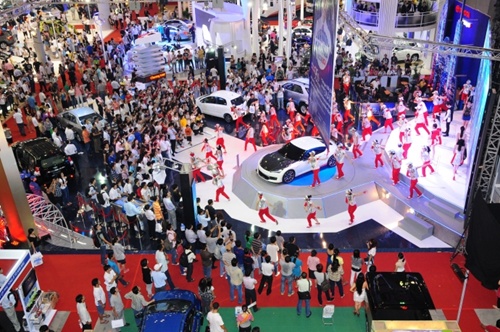NA deputies worried about revised tax on cars
 |
| An image of the 2015 Vietnam International Motor Show in the capital city.- Photo baogiaothong.vn |
Discussing the issue at the NA meeting on November 13, Le Van Lai, deputy from central Quang Nam Province where the auto manufacturing industry contributes half of the local budget, said if the tax on vehicles with engine displacements of under 2,000cu.m was decreased following the Government's proposal, the Quang Nam-based Truong Hai Auto Corporation (Thaco) and the national auto industry could possibly go bankrupt.
Earlier, the Government submitted that taxes levied on vehicles with engine displacement of under 2,000cu.m should be reduced by 5 to 25 per cent. Meanwhile, the Government also wanted to raise the special consumption tax on vehicles with engines of 3,000cu.m to 4,000cu.m; 4,000cu.m to 5,000cu.m; and 5,000cu.m to 6,000cu.m. The proposed tax increases would rise from 60 to 90 per cent, 60 to 110 per cent, and 60 to 130 per cent, respectively.
Lai noted that when the import tax on autos is reduced to zero per cent in ASEAN by 2018, the import of cars would accelerate in the country, and domestic automakers would be faced with an unequal competition, as local automakers are seen as being inexperienced, with low investments and backwards technologies.
"I take as an example, if the import tax rate goes to zero in 2018, while the special consumption tax is reduced to the proposed level, Thaco would not be able to maintain its production. By that time, about 10,000 workers would be jobless and the province would lose 50-60 per cent of its budget. That would bring about other corollaries in society. We are really of a divided mind as to what to do," said Lai.
"They need to consider this issue. I propose that the Government issue a full report about corollaries, in order to cope with them when they are introduced and for us to be able to ‘press the button' without our hand trembling with fear."
Sharing this opinion at the meeting, deputy Ho Thi Thuy from northern Vinh Phuc Province proposed considering a revision in the Law on Special Consumption Tax. Such a revision had lacked its sustainability in the budget collection and affected the businesses' operation – not only for automakers, but also subsidiary businesses.
She said that the price of domestically-assembled autos was currently 20 per cent higher than in other ASEAN countries. If the special consumption tax went down, imported cars in the region would enjoy double advantages of having the import tax and special consumption tax reduced – thus blocking domestic auto production.
"The increase of the special tax on imported vehicles with engine displacements from 2,500cu.m would not affect much, because it has occupied nearly 30 per cent of the market share. If the tax on vehicles with low displacement is reduced, the number of 2,000cu.m and below vehicles will overwhelm the domestic market because the majority of people need vehicles with small displacements," said Thuy.
Deputies Duong Hoang Huong and Nguyen Cao Phuc both said that the finance ministry should have multi-faceted assessments and estimations on the decrease in the special consumption tax – how it would impact the state budget, people's livings, traffic accidents, and traffic congestion – so that the NA could consider whether or not to reduce the tax.
According to the General Statistics Office, Viet Nam imported 95,000 cars in the first ten months of this year at a cost of US$2.31 billion – resulting in a year-on-year increase of 82.8 per cent and 100.2 per cent, respectively.
What the stars mean:
★ Poor ★ ★ Promising ★★★ Good ★★★★ Very good ★★★★★ Exceptional
Latest News
More News
- Vietnamese businesses diversify amid global trade shifts (February 03, 2026 | 17:18)
- Consumer finance sector posts sharp profit growth (February 03, 2026 | 13:05)
- Vietnam and US to launch sixth trade negotiation round (January 30, 2026 | 15:19)
- NAB Innovation Centre underscores Vietnam’s appeal for tech investment (January 30, 2026 | 11:16)
- Vietnam moves towards market-based fuel management with E10 rollout (January 30, 2026 | 11:10)
- Vietnam startup funding enters a period of capital reset (January 30, 2026 | 11:06)
- Vietnam strengthens public debt management with World Bank and IMF (January 30, 2026 | 11:00)
- PM inspects APEC 2027 project progress in An Giang province (January 29, 2026 | 09:00)
- Vietnam among the world’s top 15 trading nations (January 28, 2026 | 17:12)
- Vietnam accelerates preparations for arbitration centre linked to new financial hub (January 28, 2026 | 17:09)
















 Mobile Version
Mobile Version